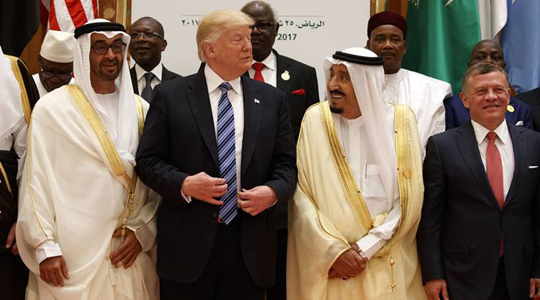Washington, Jun 7: U.S. President Donald Trump spoke to Saudi Arabia's King Salman and called for a united Gulf Cooperation Council to fight terrorism and promote stability in the region, amid deepening diplomatic crisis in Qatar.

Both the leaders discussed ways to prevent terror financing and eliminate extremism by any country in region, the White House said on Tuesday.
During the phone call, Mr. Trump underscored that a united Gulf Cooperation Council is critical to defeating terrorism and promoting regional stability, the White House said.
The White House statement came a day after Saudi Arabia and three other Arab countries — Egypt, Bahrain and the UAE — cut off diplomatic ties with Qatar.
In a tweet, early morning, Mr. Trump apparently supported the actions of four Arab countries to cut off diplomatic relationship with Qatar.
The U.S. continues to be in close communication with all the parties to resolve the issues and restore cooperation which is so important to regional security there, White House Press Secretary Sean Spicer told reporters.
“I think there is note that his message of toughness on terror finance and extremism is being heeded by countries in the region. But the U.S. still wants to see this issue de-escalated and resolved immediately, keeping with the principles that the president laid out in terms of defeating terror financing and extremism,” he said.
Mr. Spicer said Mr. Trump had a very, very constructive conversation with the Emir of Qatar during his visit in Riyadh.
“At that time, he was very heartened by the Emir's commitment to formally join the terrorist financing targeting centre and showing their commitment to this issue,” he said.
At a separate briefing, State Department Spokesperson Heather Nauert said the U.S. recognises that Qatar has made some great efforts to try to stop financing of terror groups, including prosecuting suspected financiers, freezing assets, and introducing stringent controls on its banking system there.
“However, let me make this clear: They have made progress, but they still have work to do. More work needs to be done,” she said.
“I think our relationship with Qatar is one that's strong. It's one that we continue to cooperate with Qatar and other countries in the region in the fight against terrorism. Secretary of State Rex W Tillerson talked about this today,” she added.
“He said every country in the region has their own obligations and they need to live up to terminate their support for terrorism and extremism however it manifests itself anywhere in the world,” she said.
Ms. Nauert praised Qatar for its role in fight against terrorism.
“The U.S. and its coalition, we're grateful to the Qataris for their longstanding support of our presence there in that nation. They have helped to provide us with an enduring commitment to regional security. The Department of Defence has talked about this,” she said.
“We have no plans to change our posture in Qatar and we would encourage all of our partners to try to work together to reduce tensions. That's something that the Secretary spoke to as well,” Ms. Nauert said in response to a question.





Comments
Add new comment